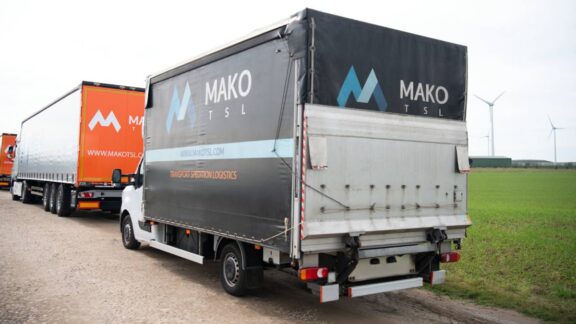The TSL industry is undergoing a period of dynamic change, where technological advancement is no longer just an option but a strategic imperative. In the face of increasing competition, volatile markets, and rising customer expectations, transport companies must invest in innovation. At MAKO TSL, we are also successfully implementing modern technologies, demonstrating how this approach translates into tangible operational and strategic benefits.
Telematics: intelligent fleet management systems
Telematics, the synergy of telecommunications and informatics, has become the foundation of digital fleet management in transport and spedition. Powerful telematics tools provide comprehensive real-time data on every aspect of transport operations. Thanks to advanced systems, companies in the TSL industry gain access to precise information on:
- Vehicle Location: GPS systems enable accurate tracking of vehicle positions, which is crucial for route planning, monitoring deliveries, and quickly reacting to any deviations from the norm.
- Fuel Consumption: Detailed data allows for the identification of inefficient practices, optimization of driving styles, and precise cost accounting. Crucially, this results in significant savings in operational costs for any transport company.
- Engine and Vehicle Operating Time: Monitoring these parameters supports effective management of driver working hours, compliance with regulations, and planning vehicle inspections and maintenance.
- Driver Behavior: Analysis of data on speed, braking, and acceleration makes it possible to identify risky behaviors, implement training programs, and improve road safety.
At MAKO TSL, the implementation of telematics systems has led to a number of benefits for the company. First and foremost, it has resulted in significant operational optimization, enabling more efficient use of our resources and a reduction in order fulfillment times. The reduced fuel consumption is not only an economic benefit but also an ecological gain, something our entire company has long been committed to. As a result, overall fleet efficiency increases, and the company can offer customers a higher level of service.
AI optimizes the TSL industry
Artificial intelligence, as in other business sectors, is revolutionizing the TSL industry. According to forecasts cited in the “Transport Market 2024/2025” report prepared by Trans, 2025 marks a stage where AI is transforming from a tool that supports simple tasks into a technology that enables autonomous decision-making. Thanks to its ability to process vast data sets and learn from them, AI enables advanced predictive analytics, supports proactive management strategies, and facilitates real-time data processing on an unprecedented scale.
Traditional route planning methods often prove insufficient in the dynamic environment of road transport. AI algorithms are changing this paradigm by dynamically adjusting routes in real time. Today, even popular solutions available to passenger car drivers are based on this technology, which gives a sense of how complex modern TMS systems for transport companies must be. They take into account a number of variables, such as current road conditions (traffic jams, accidents), weather conditions (downpours, blizzards), and specific road restrictions (tonnage bans, temporary border checks). This type of advanced planning leads to significant savings in time and resources, a substantial reduction in empty runs, and consequently, lower overall fuel consumption for the transport company.
Additionally, our modern fleet at MAKO TSL is equipped with ADAS systems, such as adaptive cruise control and collision warning systems. Innovations like these not only increase road safety but also contribute to reducing the burden on drivers, making their work more comfortable and less stressful.
The future of the TSL industry in the digital age
Investing in modern technologies like telematics and artificial intelligence is no longer a luxury but a necessity in the fast-growing TSL industry. At MAKO TSL, adapting to these solutions is a strategic decision that translates into tangible benefits: from significant optimization of operational costs and improved service quality to increased market competitiveness. Telematics provides precise real-time data, enabling effective fleet management, while AI introduces predictive analytics and automation, revolutionizing route planning, resource management, and processes. In the digital age, the ability to innovate and leverage the potential of new technologies is the key to success and long-term growth in the TSL industry.



